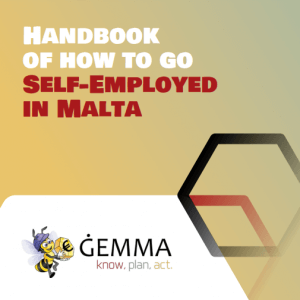Click below to download the ĠEMMA e-Book on How to Go Self-employed in Malta.
Click here to see the ĠEMMA Webinar on being Self-employed.
On 30th September, ĠEMMA organised a webinar on being self-employed. During the Seminar, Mr David Spiteri Gingell launched its e-Book on how to go self-employed in Malta. The eBooks provide information on key differences between being self-employed and being an employee; employing other persons in your business, and in how to handle VAT, social security and income tax matters. The e-Book is interactive and enables you to download relevant forms that you may need, as a self-employed person, to take care of in relation to the above matters.
Ms Abigail Mamo, who is the CEO of the Chamber of SMEs, underlined a number of challenges that persons who are self-employed or who are thinking of becoming self-employed face – particularly to those self-employed persons who work on their own: which constitute 30,000 out of 40,000 of the Chamber’s members. Challenges faced include (a) lack of knowledge of the obligatory requirements that a self employed person needs to address; (b) that most people transition into a self-employment and hence during the transition process they may not be that careful in complying with obligatory conditions; (c) being a self-employed person carries with it a high degree of informality, where-in the separation between work and one’s personal life is not as distinct as that of an employee; (d) a tendency to be mistrustful of dues paid to government for which no direct benefit is seen, and hence a preference to set out their own arrangements.
Professor Russell Smith, who is Professor in Entrepreneurship and Director of the Centre for Entrepreneurship and Business Incubation (CEBI) at the University of Malta, stated that research in the USA shows that 50% of self employed persons cease trading by the 5th year, and that single person self-employed businesses cease trading earlier than self-employed business that have employees. Prof. Smith emphasised that the e-Book issued by ĠEMMA should be mandatory reading for persons who are or wish to move into self employment as it informs on critical administrative and regulatory matters that self-employed persons should follow – and in doing avoid potential future issues with the revenue departments or end up short-changing themselves with regard to the contributory social benefits.
Dr Joe Gerarda, who is the Regulator for the Family Business Office, emphasised the importance of planning to ensure the continuity of a self employed business to a more mature business which can leverage on its goodwill and assets, and which would allow such a business to be sold as a going concern. The key point made is consolidatiing for growth and succession is a process that demands planning, and as importantly bringing into the process the founder’s younger generation.
Mr David Spiteri Gingell stated the ĠEMMA’s role is that of a guide: of ensuring that self-employed persons have access to the right information so that they can make the best informed decision on money matters that impact their and their family’s financial circumstances across their life journey. One specific example mentioned was that most persons associate the contributory social security system to the retirement pension – when in fact the contributory social security system is an insurance providing, coverage, amongst other matters, for sickness, invalidity and death. Thus, a self-employed person who skimps the full payment due of his/her social security contribution by under-declaring his or her income to save money today is jeopardising his/her and the spouse’s future in the event of an early death or sickness.




